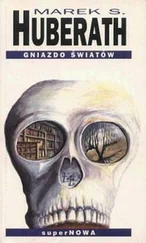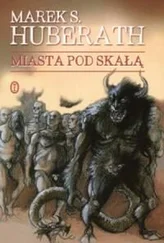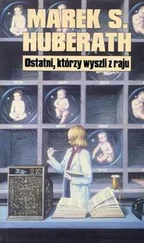He noted how quickly he was aging. Every time he ran his fingers through his hair, some hair came out in his hand. According to the registry he was the youngest commandant of the factory in 123 years, which was flattering, and yet he counted the days until his move to Lauhl.
By noon he had taken care of personnel matters: complaints, conflicts, requests for transfer. He thought with irony that at noon the guards could eat something, gossip a little, rest. Only members of the high command kept working.
Today Jesse, a guard for several years, had made an appointment to see him. Jesse was the type who moved from Land to Land, secure in the knowledge that he would never fall in rank. A paper pusher. Jaspers could fall into that rut too, since he had become a guard so early.
“In barracks B3,” Jesse reported in a drawl, “we have this individual named Macura. An older worker, strong as an ox.”
Barracks B3… That was his, Jaspers thought. Where in the dim light of a night lamp he once read a book about a dying world.
At what point had he left off reading? In what place had he stopped the flow of time for those two good but bickering sisters, Ozza and Hobeth?
I should return to that book someday, he thought, making himself a promise that he knew he wouldn’t keep.
“Macura has a sadistic streak; he likes to torment his fellow workers,” said Jesse. “Because of him there are many bruises, injuries. I don’t know what to do with him.”
“Haven’t you read Methodology of Social Work for Guards?”
“Of course…”
He obviously didn’t read it, Jaspers thought.
“That kind of worker is indispensable to the collective,” he said. “He substitutes for you at work. He keeps the hall obedient. Intervention by a guard becomes unnecessary when the workers keep themselves in line. You could reward Macura, but you don’t need to.”
“He is an animal, so primitive.”
“That is also the rule. Primitive, but clever. Such a worker will never advance. He is content with the sense of his momentary power over others. He knows whom to bow to, and whom he can use his fists on.”
Jesse had no more questions, so Jaspers made a wave of dismissal, indicating that he had other matters to attend to.
The intellectual level of this Macura character, what did it matter? If he were smarter, he would occupy a higher rung on the ladder. It was obvious that a guard had more brains than a worker. What was Jesse’s problem? If the man had done his homework and read the textbook, Jaspers thought, I wouldn’t have to spend my time giving him instruction.
Daphne dragged herself off the settee. The part about Heather changed her mind about Jaspers: she disliked him. Around the driver’s seat were empty beer cans, Lone Sail. They rattled whenever the truck hit a bump. Gary was driving, his bloodshot eyes fixed on the road. He was pale, covered with sweat. He’d had a lot of beer. Fuzzy-headed, he drove slowly, with care.
There was the Tolz tollgate already: the barrier made of bent metal pipe. It was in three colors once, but now the paint had fallen off and the color was only rust. Behind the barrier stood a small, concrete building with a slanted Tolz on a wooden sign.
The truck stopped. From the building came a border guard and turned a winch to raise the barrier. Gary pulled into a parking area, where a trailer waited, with the colors of Emigrant, emptied of someone’s possessions. It didn’t take long for the crew there to unhitch the trailer that contained the Bolyas’ belongings and attach the empty trailer.
He didn’t see Spig. He had thought the man would come to say good-bye, but there was no sign of him. Probably too caught up with the entry red tape.
The truck turned and took the road back.
Gary, eyes shut, sat slumped in the passenger’s seat. Daphne drove.
“That whole story, it shows how a guy can become a shit when he gets too caught up in his career. He abandoned that woman.” She glanced at her colleague, who was trying to sleep. “Did you get that far in the book?”
“Abandoned? As a guard, he can’t have such a union. Besides he was stationed in another hall.”
“But that was the reason…” Daphne needed to discuss this. “He takes off her clothes, screws her, and then she no longer pleases him.”
“That wasn’t in the book. He was just sweet on her.”
“It first showed when they met after work and she dressed differently.”
“After work? That’s impossible. People go back to the barracks and hit the sack.”
“They arranged to get off early a few hours and went to the canteen. And she put on a skirt instead of her worker’s slacks. Then he saw that although the rest of her was thin, she was big in the hips, and her rear stuck out. That broke the bubble. Also, she didn’t have breasts, and her legs were too muscular. Her neck was all right, but the back of it was getting thick, and the features of her face were too big for her head. She had nice eyes, but her nostrils…”
“They didn’t meet after he became a guard.”
“It happened while he was still a Monitor. And her voice, it was like a sheep bleating. So Jaspers decided she was an idiot.” Daphne was incensed, as if Gary had to answer for the character’s behavior.
“What Jaspers? What are you talking about, woman?” Gary looked at her in amazement. “Cedar. The guy’s name is Cedar.”
Daphne turned, confused.
“Better watch the road,” he said. “There’s fog up ahead. And on the left, a new blot.”
She steered away from the attraction of the black smear.
“Jaspers,” he went on, “is a common criminal. Pathologically aggressive. He permanently crippled his barracks mate, Crooks. Broke his shins. Out of envy for his rank of Monitor, they decided. Jaspers is rotting in some penal division of the factory. Cedar was the one who became a guard.”
“And Heather, what will happen to her?” Daphne felt close to the heroine. Curiously, they had similar builds, similar problems with their builds.
“There’s been no Heather yet.”
“She works on the assembly line.”
“It’s Cynthia who works on the assembly line. She’s tall, graceful, has thick, curly hair. You have to like Cynthia.” He spoke with grim satisfaction. “Cedar is trying to figure out a way to make her Secretary of the barracks, then a guard. I don’t think he has a chance with her. Anyway she’s moving to Lauhl soon.”
Zef’s next note:
Playing with the numbers. Let’s take the Significant Names. There are, in this order, 144, 1,728, 20,736, and 248,832, and they come in groups of 9, 27, 81, and 243. Too much, right? You see no pattern, not at first.
But all you need is a handheld calculator.
The number of Names = 144 × 12 (n - 1), where n is the degree of the world’s nestedness.
Behind this relation may lie something fundamental. A pity I can’t talk to Dave.
Zef’s notes, Gavein realized, contained an element of theater. The young man liked to telescope the account of his reasoning, give his conclusions abruptly, then hold forth on them like a philosopher.
That morning, Gavein demanded that Dr. Nott operate on Ra Mahleiné immediately.
“Your wife has only a few days to live.”
“She can rise from her chair, her hair has stopped falling out, and she even has a tan.”
“It’s a blip on the screen of nature, Dave, a fluctuation. If you could look inside her”—Nott’s wattle wagged—” you’d find few organs free of metastases. It makes no sense, none, to operate.”
Читать дальше












